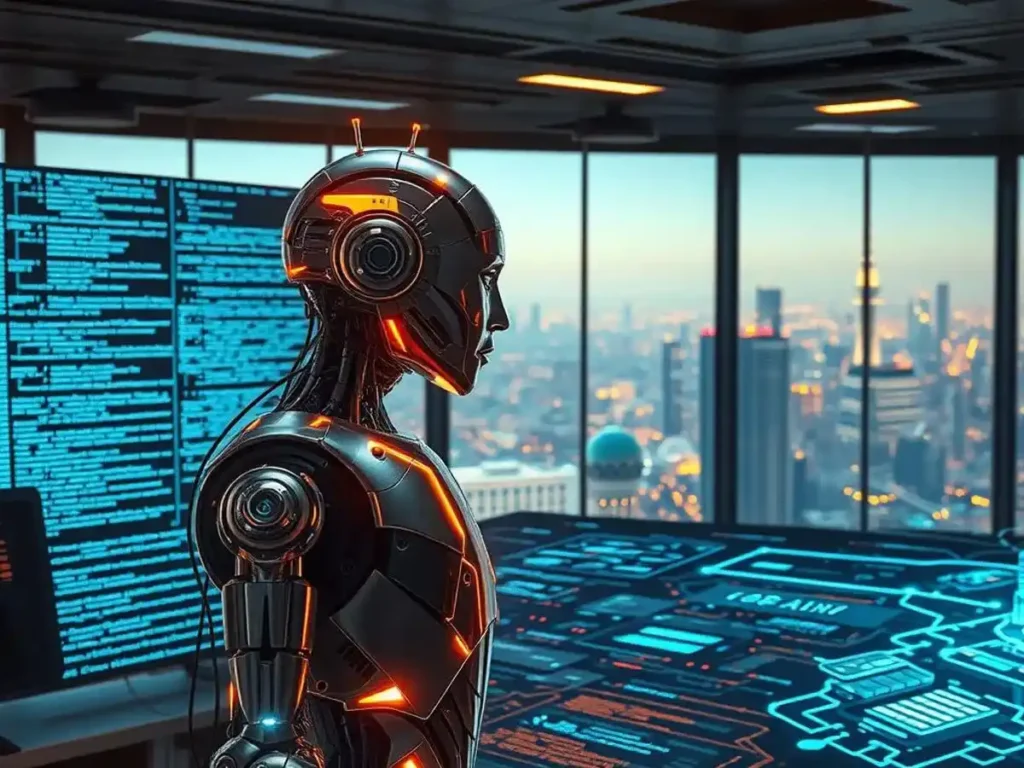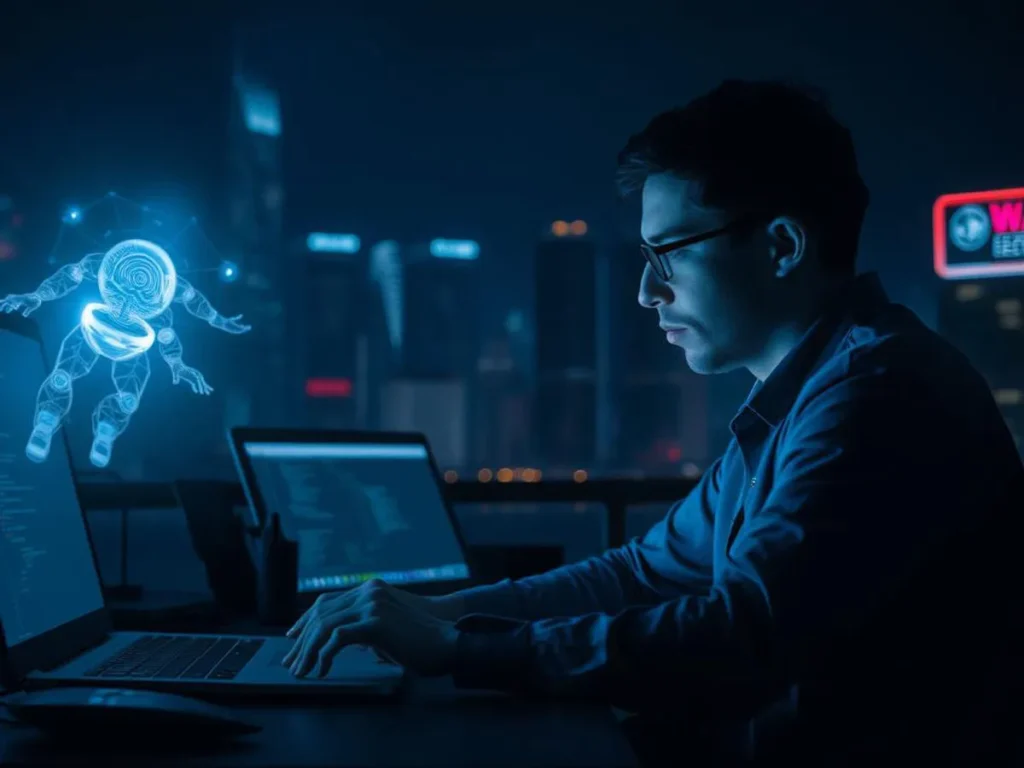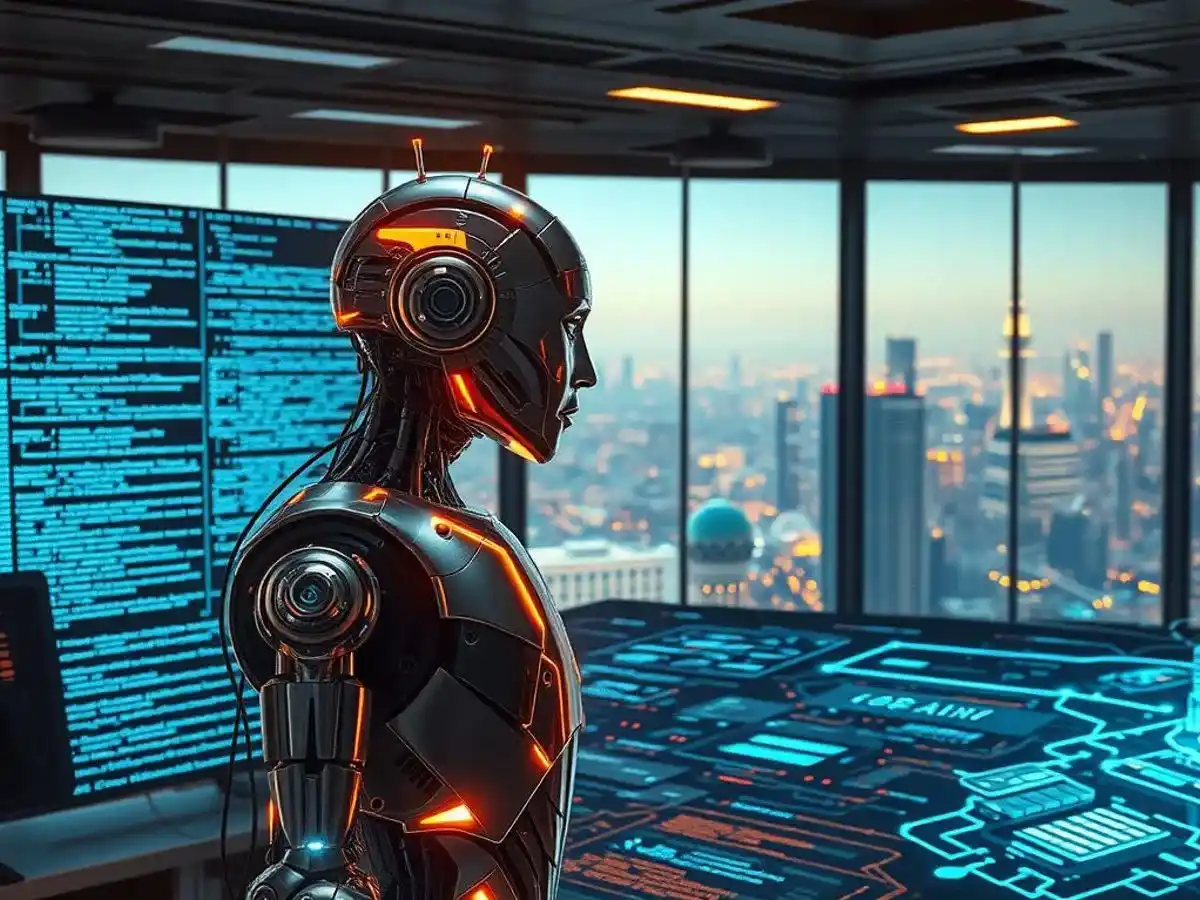Technology is advancing fast, raising a big question: Can AI replace software Engineers in tech? The idea that machines could do the work of software development has sparked a lot of debate. Experts and professionals are all talking about it.
Artificial intelligence in software development is showing great promise. It automates some tasks and makes work more efficient. But, can AI truly match the complexity and creativity of humans? This is still up for debate.

Looking into this, we must think about both the good and bad sides of using AI in software development. By looking at today’s tech and what’s coming next, we can see if AI will change or shake up the role of software engineers.
The Evolution of AI in Software Development
AI’s role in software development has grown a lot over time. It has brought new ways and tools to the table. This change is thanks to big steps forward in artificial intelligence.
Historical Context of AI in Programming
The idea of AI in programming started in the 1960s. Back then, people were trying to automate coding tasks. But it wasn’t until the 1980s that AI really started to help in software development.
Recent Breakthroughs in AI Coding Capabilities
In recent years, AI has made huge leaps in coding. This is thanks to new advances in machine learning and large language models.
Large Language Models and Code Generation
Large language models have changed how AI writes code. They can make complex code and even whole programs from just text. For example, GitHub’s Copilot can create high-quality code.
Machine Learning Applications in Development
Machine learning is used in many parts of software development. It helps with predicting things, testing, and fixing bugs. These uses have made development faster and cut down on mistakes.
| Year | Milestone | Impact |
|---|---|---|
| 1960s | Early AI experiments | Initial exploration of AI potential |
| 1980s | Rule-based systems | Practical application of AI in coding |
| 2020s | Large language models | Advanced code generation and completion |
The future of programming with AI is bright. As AI keeps getting smarter, it will change software development a lot.
Current State of AI Coding Tools
AI coding technology is moving fast, changing the game for software developers.
GitHub Copilot and Similar AI Assistants
GitHub Copilot is a big deal in AI coding. It can suggest code and even write whole functions. Other AI tools are coming out, giving developers coding tips and doing routine tasks for them.
Low-Code and No-Code Platforms
Low-code and no-code platforms are also big in AI. They let users make apps with little coding. AI handles the hard stuff, making it easier to develop.
Automated Testing and Debugging Tools
They use AI to find bugs and make code better. This makes coding faster and more efficient.
As AI keeps improving, its role in tech will only grow bigger.
How AI Is Already Changing Software Engineering Practices
AI is more than a tool; it’s a partner in software engineering. It’s changing how developers code, test, and manage projects. This change is big and far-reaching.
Code Generation and Completion
AI’s biggest impact is on code generation and completion. This speeds up development and cuts down on errors.
Bug Detection and Resolution
AI is also changing bug detection and resolution. It uses advanced algorithms to find bugs early. It makes software better and more reliable.
Development Workflow Optimization
AI is making development workflows better. It streamlines processes and predicts where things might slow down. This includes Continuous Integration/Continuous Deployment (CI/CD) and predictive analysis for managing projects.
Continuous Integration/Continuous Deployment (CI/CD)
AI makes CI/CD pipelines better by automating testing and finding integration issues. It also predicts when deployments might fail. This leads to smoother, faster software releases.
Predictive Analysis for Project Management
Predictive analysis, powered by machine learning, helps project managers. It forecasts timelines, identifies risks, and helps with resource allocation. This data-driven approach helps teams make better decisions and adapt to changes.
It’s about making developers better at their jobs. By using AI, developers can tackle more complex and creative tasks. This opens up new opportunities and helps them grow in an AI-driven industry.
Can AI Replace Software Engineers? The Central Question
The use of AI in software development has raised a big question: can AI replace human software engineers? We need to look at what AI can do and what it can’t in software engineering.
AI has grown a lot in recent years. It has improved a lot in machine learning and coding. But, how much can AI really replace human engineers is still up for debate.
What Parts of Software Engineering Can Be Automated
Some parts of software engineering can be automated more than others. Routine coding tasks like making boilerplate code and basic debugging can be done by AI tools. Also, AI tools for testing and debugging can find and fix problems faster than humans sometimes.
| Task | Level of Automation | Potential for AI Replacement |
|---|---|---|
| Routine Coding | High | High |
| Complex Problem-Solving | Low | Low |
| Basic Debugging | Medium | Medium |
The Human Elements That Resist Automation
Even with AI’s growth, some things can’t be automated. Understanding business context and user needs needs empathy and nuance that AI doesn’t have. Also, solving complex problems and designing system architecture need human creativity and critical thinking.
Expert Opinions and Industry Predictions
Experts in the field have different views on AI replacing software engineers. Some think AI will help humans do better, while others worry about job loss. A recent survey found that many leaders think AI will change software engineering, but not replace human engineers.
The debate on AI’s impact on software engineering is ongoing. Understanding both the challenges and opportunities of AI integration will help us prepare for the future.
Tasks Where AI Excels in Software Development
AI is changing software engineering, doing well in certain areas. Artificial intelligence in software development is making tasks more efficient. It also reduces human mistakes.
Routine Coding and Boilerplate Generation
AI is great at routine coding and making boilerplate code. It creates code snippets for developers, letting them work on harder tasks. This makes development faster and cuts down on errors.
Basic Debugging and Testing
AI is also good at basic debugging and testing. It checks code for bugs and offers fixes. This helps developers focus on complex problems.
Documentation and Code Maintenance
It creates and updates documentation automatically. This is super helpful in big projects where updates are needed fast.
API Documentation Generation
AI can make API documentation quickly and accurately. This automation in software engineering saves a lot of time. It makes APIs easier to use and understand.
Code Refactoring and Optimization
AI also helps with code improvement and optimization. It analyzes code to suggest better versions. This makes code better and easier to maintain over time.
In summary, AI plays a big role in software development. It’s good at many tasks, from simple coding to complex maintenance. As automation in software engineering grows, AI will keep being a key part of development.
Areas Where Human Engineers Maintain Advantage
AI is getting better, but human skills are still key in software engineering. We see this as we use AI more in our work. Some tasks just need a human touch.
Complex Problem-Solving and System Architecture
Human engineers are great at solving tough problems and designing systems. They need to know both the tech and business sides of a project. AI can look at data, but humans make the big decisions.
Understanding Business Context and User Needs
Getting what the business and users need is where humans shine. AI can handle data, but humans understand the bigger picture. It’s about knowing the tech needs and caring about users.
Ethical Considerations and Decision Making
Ethics and making choices are big for human engineers. AI doesn’t have the same moral compass as humans. Decisions need to consider society, laws, and values.
Handling Ambiguity and Requirement Changes
Dealing with unclear or changing needs is a human strength. AI finds it hard with unclear or fast-changing needs. Humans can adjust and decide with incomplete info.
Cross-Functional Collaboration
Working well with others is a human skill. Software development teams need to work together. Humans handle team work better than AI.

In summary, AI has changed software development, but humans are still crucial. They excel in complex problem-solving, understanding business needs, and making ethical choices. As AI grows, humans will focus on tasks that need their unique abilities.
Economic and Industry Impact of AI in Software Development
The use of AI in software development changes many things. It affects job roles and how much things cost. As AI gets more common, the industry is seeing big changes.
Potential Job Market Shifts
AI is changing the job market in software development. It might take some jobs, but it also opens up new ones. Now, software engineers can work with AI systems.
New Roles Emerging at the AI-Human Interface
New jobs are coming because of AI. Roles like AI trainer, AI ethicist, and AI integrator are needed. They need people who know about software and AI.
Productivity and Cost Implications
AI is making software development faster and cheaper. It automates simple tasks and makes code better. A study found that using AI can significantly reduce costs and boost productivity.
| Aspect | Pre-AI | Post-AI Integration |
|---|---|---|
| Development Time | Longer due to manual coding | Shorter with AI-assisted coding |
| Cost | Higher due to human error and rework | Lower with reduced debugging needs |
| Job Roles | Focused on coding and debugging | Shifting towards AI management and ethics |
In conclusion, AI is making a big difference in software development. It changes jobs, creates new ones, and makes things more efficient. As the industry keeps growing, it’s important to understand these changes.
Skills Software Engineers Need in an AI-Enhanced Future
AI is changing how we code, and engineers need new skills. As ai coding technology gets better, they must learn to work with AI tools.
Being able to work with AI is key. Engineers need to know how to use AI tools to boost their work and solve problems better.
Adapting to Work Alongside AI Tools
Engineers must learn to use AI in their work smoothly. They need to know AI’s strengths and weaknesses. Then, they can use their skills to help AI.
Developing AI-Resistant Competencies
AI is great at many things, but some tasks are still for humans. These include solving complex problems, understanding business needs, and making ethical choices. Engineers should work on these AI-resistant skills.
Continuous Learning and Specialization
The world of machine learning disrupting software engineering is always changing. Engineers must keep learning and specialize in areas that AI can’t do as well.

By focusing on these skills, software engineers can stay important in an AI-enhanced future.
Case Studies: AI Success Stories in Software Development
The use of artificial intelligence in software development has brought many success stories. Companies use AI to make their development better, improve product quality, and get to market faster.
Enterprise Implementation Examples
Big companies have started using AI tools to make their development smoother. For example, GitHub Copilot, an AI code completion tool, has helped many organizations work better.
Productivity and Quality Improvements
AI helps make software development faster and better. It automates simple tasks, letting developers tackle harder problems. This leads to quicker and higher quality software.
Lessons Learned from Early Adopters
Companies that were first to use AI in software development have learned a lot. They know about the best ways to start, how to manage changes, and the need for human checks. These lessons are key for others wanting to use AI impact on software developers to their advantage.
As AI keeps getting better, it will be even more important for software development’s future.
Challenges and Concerns with AI Replacing Software Engineers
The rise of AI in software engineering has sparked a lot of debate. As AI gets better, we must look at the hurdles it brings to software development.
Quality and Reliability Issues
One big worry is the quality and reliability of AI code. AI can write code fast, but it often misses the human touch. Making sure AI code meets standards is a big challenge.
Security and Intellectual Property Concerns
AI can also bring security risks if not watched closely. There are also questions about who owns the rights to AI-generated code.
Ethical and Societal Implications
AI in software engineering raises big ethical and societal questions. There’s worry about job loss as AI takes over some roles. There’s also the issue of bias in AI code, which can keep old biases alive if the training data is not right.
Job Displacement Concerns
Many fear AI could replace human software engineers. But AI might also create new jobs we can’t predict yet.
Bias and Fairness in AI-Generated Code
It’s key to make sure AI code is fair and unbiased. This means choosing the right data for AI training and keeping an eye on it to avoid bias.

In summary, AI is a game-changer for software engineering but comes with its own set of challenges. By understanding these, we can make sure AI improves the field without causing too much trouble.
Table of Contents
Conclusion: The Future Landscape of Software Engineering
AI is changing software development, making us think about the future of programming and automation. It boosts productivity and changes how we work.
AI is great at simple coding and basic debugging. But, humans are better at solving complex problems and making ethical choices. AI will handle the easy tasks, letting humans focus on creative and complex work.
The industry will keep growing, and we need to learn to work with AI. New roles will appear, and the job market will change. There will be big changes in productivity and costs. It’s important for everyone to adapt to this new world.


Can you be more specific about the content of your article? After reading it, I still have some doubts. Hope you can help me. https://accounts.binance.com/hu/register?ref=IQY5TET4
Equili